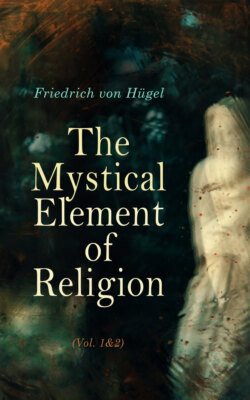Читать книгу The Mystical Element of Religion (Vol. 1&2) - Friedrich von Hügel - Страница 61
На сайте Литреса книга снята с продажи.
2. Such a conception not Pelagian.
ОглавлениеBut, in the second place, is not such a view of life Pelagian at bottom? Have we not argued throughout, as if the religious life were to be begun, and carried on, and achieved simply by a constant succession of efforts of our own; and as though it could be built up by us, like to some work of art, by a careful, conscious balancing of part against part? Is not all this pure Naturalism? Is not religion a life, and hence an indivisible whole? And is not this life simply the gift of God, capable of being received, but not produced by us; of being dimly apprehended as present, but not of being clearly analyzed in its process of formation?
Here again there is a true answer, I think. Simply all and every one of our acts, our very physical existence and persistence, is dependent, at every moment and in every direction, upon the prevenient, accompanying and subsequent power and help of God; and still more is every religious, every truly spiritual and supernatural act of the soul impossible without the constant action of God’s grace. Yet not only does all this not prevent the soul from consciously acting on her own part, and according to the laws of her own being; but God’s grace acts in and through the medium of her acts, inasmuch as these are good: so that the very same action which, seen as it were from without, is the effect of our own volition, is, seen as it were from within, the effect of God’s grace. The more costly is our act of love or of sacrifice, the more ethical and spiritual, and the more truly it is our own deepest self-expression, so much the more, at the same time, is this action a thing received as well as given, and that we have it to give, and that we can and do give it, is itself a pure gift of God.
What then is wanted, if we would really cover the facts of the case, is evidently not a conception which would minimize the human action, and would represent the latter as shrinking, in proportion as God’s action increases; but one which, on the contrary, fully faces, and keeps a firm hold of, the mysterious paradox which pervades all true life, and which shows us the human soul as self-active in proportion to God’s action within it, according to St. Bernard’s doctrine already quoted. Grace and the Will thus rise and fall, in their degree of action, together; and man will never be so fully active, so truly and intensely himself, as when he is most possessed by God.
And since man’s action is thus in actual fact mysteriously double, it should ever be so considered by him; and he should, as St. Ignatius of Loyola says, “pray as if all depended on his prayer, and act as if all depended on his action.” Hence all man’s action, though really incapable of existing for an instant without the aid of God, and though never exclusively his own, can be studied throughout, preliminarily as though it were his exclusive production on its analyzable, human side. And man not only can, he ought to be as thoughtful and careful, as reasonably analytic and systematic about this study of his action as he was careful and consistent in its production,—in both cases, whilst praying and believing as though it were all from God, he can and should behave also as though this action were exclusively his own. As St. Thomas admirably says: “We attribute one and the same effect both to a natural cause and to a divine force, not in the sense of that effect proceeding in part from God, and in part from the human agent. But the effect proceeds entire from both, according to a different mode: just as, in music, the whole effect is attributed to the instrument, and the same entire effect is referred to man as the principal agent.”[41]
